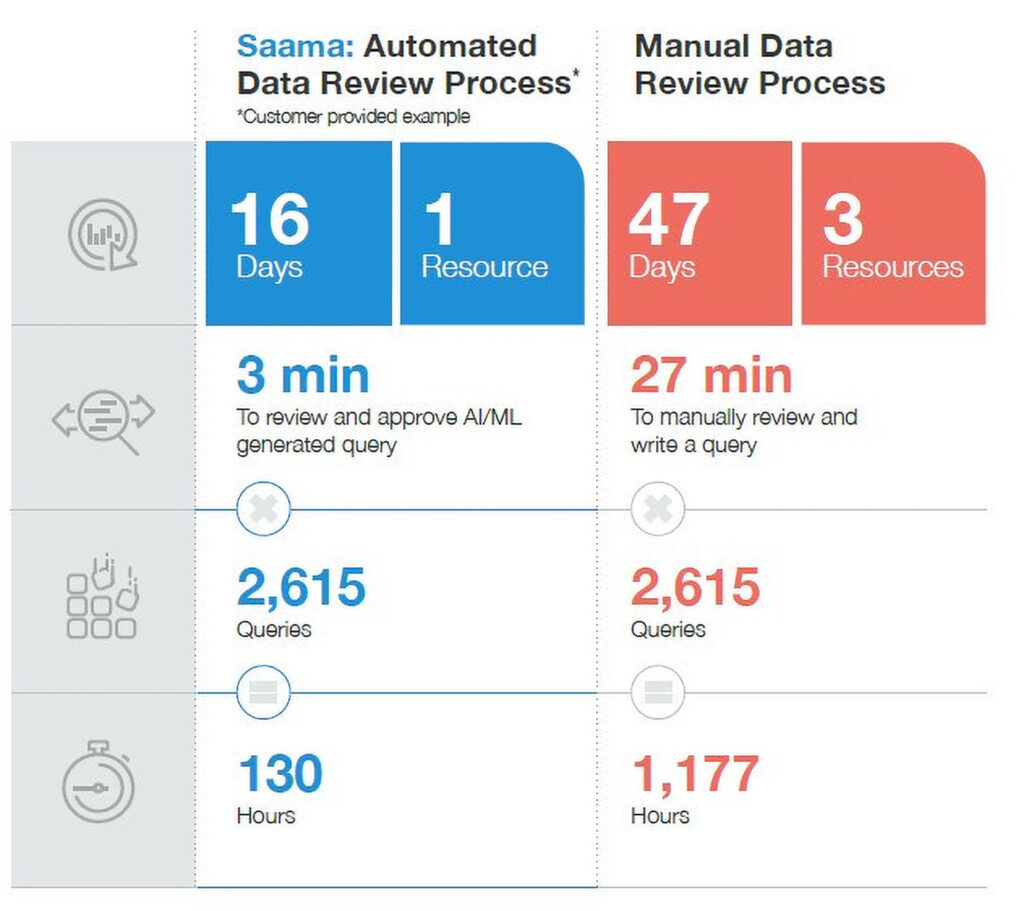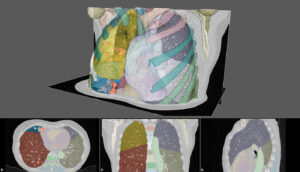By Tiffany Yesavage, PhD
According to Sundar Pichai, the CEO of Alphabet and Google, artificial intelligence (AI) will have a greater impact on humanity than fire, electricity, and the internet.1 Generative AI can now pass the bar exam2 and write Hollywood screenplays.3 How, then, might AI transform clinical trials over the next few years? GEN recently interviewed experts from four leading companies to gain their perspectives.
Staying on top of the jargon
“AI is the creation of systems that can perform tasks requiring human-like intelligence,” says Malaikannan Sankarasubbu, vice president of AI research at Saama, a company that provides AI- and machine learning–based solutions that can accelerate clinical development and commercialization. He adds that machine learning is a subset of AI that enables systems to learn from data without explicit programming. “Simply put,” he remarks, “machine learning is a tool used in developing AI systems.”

Is AI coming for jobs in clinical trials?
A top-of-mind question for many clinical trial workers is whether AI could lead to job loss. After all, Goldman Sachs recently estimated that 300 million jobs could be lost or degraded due to AI.4
Even the immediate applications of AI in clinical trials are impressive. Examples cited by Sankarasubbu include patient recruitment, trial design optimization, data cleaning, real-time monitoring, predictive analytics, and data analysis. He maintains that “AI’s ability to process data quickly, uncover hidden patterns, and provide recommendations makes AI more effective than traditional methods.”
However, he argues that AI could in fact lead to net job growth due to its capacity to make sense of the ever-expanding volumes of data associated with today’s clinical trials—including data from genomics testing, sensors, and patient questionnaires. “There are simply not enough data managers to keep up,” Sankarasubbu points out. “AI will help to ease the burden on data managers, allowing them to manage more data and more trials.”
A similar view is offered by Todd Rudo, MD, chief medical officer at Clario, which provides endpoint technology for clinical trials. He argues that nothing will ever replace the role of people in clinical trials: “Trial participants prefer working with people over AI applications. No one wants to deal with automated phone trees or chat-for-help windows. Furthermore, AI is not a replacement for scientists. Instead, it is a tool that assists them in their work.”
Solving problems—and saving lives
AI applications in clinical trials are already becoming established. For example, more than 30,000 studies have been run on a cloud computing platform from Medidata Solutions. Fareed Melhem, senior vice president and head of Medidata AI, notes that the company offers data collection, analysis, and presentation services for clinical trials through its cloud-computing AI platform.

Medidata’s AI capabilities were recently leveraged in collaboration with Every Cure, a nonprofit dedicated to drug repurposing, to find a suitable drug for a man with a rare, life-threatening disease called idiopathic multicentric Castleman disease (iMCD). “By applying AI algorithms across proteomic data, we were able to identify specific subgroups of iMCD patients who respond to existing medicines,” Melhem relates. “Fortunately, the patient happened to fall into one of these subgroups.”
Through this AI-guided discovery, the patient—who had exhausted all known treatment options and was preparing for hospice care—was successfully treated with a drug called adalimumab as a last resort. Adalimumab is currently used for inflammatory conditions such as rheumatoid arthritis and Crohn’s disease.
A lack of participant diversity is one problem that has long plagued clinical trials. Melhem highlights how Medidata recently launched a new module to help assess the diversity of trial participants and identify sites that have successfully enrolled Black and Hispanic patients. The module has already been used to generate useful findings. “At the annual meeting of the American Society of Clinical Oncology,” Melhem says, “we presented research that used anonymous enrollment data to document how certain regions with expanded Medicaid tend to have better Black and Hispanic participation in oncology trials.”
Finally, Melhem notes that AI is being used to predict major adverse events that may arise during trials. To reinforce this point, he describes how Medidata is helping clinical researchers assess the risks of chimeric antigen receptor T-cell cancer therapy. “Ultimately, our teams were able to show—using advanced AI predictive modeling—how differences in common biomarkers could predict risk for a serious life-threatening condition called cytokine release syndrome,” he reports. “This kind of research is crucial for patients receiving innovative therapies and for the clinicians who are treating them.”
Paving the way for decentralized trials
AI’s ability to improve quality control and operational efficiencies helps to enable decentralized trials. In a fully decentralized clinical trial, all activities take place at locations other than traditional trial sites, such as patient homes or local healthcare facilities.
Rudo notes that Clario works in the space of clinical trial technology and trial data management. “At Clario, data quality and operational efficiency are our main focus,” he explains. “We have over 30 different AI-enabled applications either already deployed or under development.”
To offer an example of how AI can facilitate decentralized trials, Rudo notes that Clario has AI applications that can improve spirometry tests, which measure breathing function in people with lung conditions. “Home spirometry measurements must always be performed consistently and accurately,” he emphasizes. Clario’s algorithms instantly review patient-measured spirometry results, allowing action to be taken when appropriate. He predicts that this kind of technology “will allow people from around the world to participate in clinical trials without leaving their homes.”

Rudo highlights some of Clario’s other AI-enabled solutions in the medical imaging space. Many of these are focused on quality control and data privacy, including patient confirmation, image redaction, image quality assessment, and the identification of anatomic regions of interest. “This kind of approach can save hours of work by immediately assessing data when it is first uploaded to servers,” he asserts. “When we receive image scans, we no longer have to wait hours or days for a person to perform the quality control work.”
A digital data transformation
Nareen Katta, the head of data science and analytics at AbbVie, says that technological innovations are allowing clinical research to be digitalized, resulting in data that is more accessible and actionable. He notes that this trend is evident whether data is structured or unstructured. Examples of structured data include historic clinical trial operations data and anonymous participant data such as vital signs, laboratory tests, and medical histories. In contrast, unstructured data includes images, videos, and various types of documents.
“AbbVie is on a major digital transformation journey to make drug development faster and more efficient,” Katta declares. He highlights how the company is working to integrate historically distinct areas of expertise and technology—as well as archived data from over 170 internal and external sources—into a unified knowledge platform called the AbbVie R&D Convergence Hub (ARCH).
Katta explains that AbbVie scientists use ARCH to extract insights and generate hypotheses from their data. The platform pulls together different data sets into one place, layers insights on top of the data, and incorporates various information tools. “AI capabilities are being leveraged across several use cases like precision medicine, site selection, quality management, site engagement, and safety surveillance,” he notes. “We’re already seeing significant value within clinical trials and across R&D.”
Expediting trials
Saama has a dedicated AI and machine learning research laboratory. According to Sankarasubbu, it has more than 16 researchers who publish in high-impact journals such as Nature. He adds that the company’s cloud-based, AI-powered solutions offer data aggregation, monitoring, analytics, and collaboration capabilities, and that Saama has trained over 90 AI models from scratch over the past decade.
Saama’s platform is designed to expedite the traditional data review process. “It might take a data manager 30 minutes to identify a data discrepancy and raise a query,” Sankarasubbu notes. “But with Saama’s AI, the time for that task can be reduced to just three minutes.” He argues that such improvements are crucial because they allow data managers to keep up with ever-increasing volumes of data.
Privacy concerns
With such massive amounts of data being processed on a routine basis, many people worry about the possibility of breaches—both unintentional and malicious. In fact, Google’s parent company, Alphabet, recently advised employees not to enter confidential materials into their AI chatbots due to concerns about safeguarding information.5 Could this become a problem for clinical trials?
Sankarasubbu explains that privacy breaches are unlikely to happen because of AI or machine learning alone. Instead, he notes that most breaches result from not having the appropriate measures in place to protect data in the first place.
“Any standard security measures that prevent intellectual property from leaking—like firewalls and virtual private clouds—will control who has access to what,” Sankarasubbu maintains. “These safeguards must be applied to machine learning models as well.” He adds that specific AI approaches such as federated learning allow researchers to train models without having to share the data.
AI is the future
It is clear that AI is not going away. But even though AI is inevitable, its judicious use isn’t. “Ultimately, we need to remember that AI isn’t a magic bullet. It isn’t applicable to every case,” Rudo notes. “AI is a methodology, a tool. And like any tool, deep scientific expertise will always be necessary to find the right tool for the right job.”
References
- Rajan A. Amol Rajan Interviews Sundar Pichai. BBC Radio 4 Podcast. Published July 11, 2021.
- Sloan K. Bar exam score shows AI can keep up with ‘human lawyers,’ researchers say. www.reuters.com. Published March 15, 2023.
- Child B. AI is coming for Hollywood scriptwriters—this is how they are going to do it. www.guardian.com. Published May 12, 2023.
- Kelly J. Goldman Sachs Predicts 300 Million Jobs Will Be Lost Or Degraded By Artificial Intelligence. www.forbes.com. Published March 31, 2023.
- Dastin J, Tong A. Focus: Google, one of AI’s biggest backers, warns own staff about chatbots. www.reuters.com. Published June 15, 2023.



